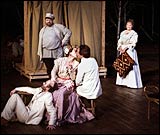
The old quandary: are Chekhov’s plays comedies, as he claimed, or dramas, as Stanislavsky & Co. staged them? In Chekhov, according to the great poet Anna Akhmatova, “everybody’s situation is hopeless. If one looks too closely, all one sees is cockroaches in the cabbage soup.” But here is the critic Stanley Kauffmann: “Chekhov stubbornly tells the truth about us, but of all great writers, he is the gentlest.” These are not irreconcilable views. Truth, however gently expressed, cuts deep; cockroaches do not deter starvelings from the soup. Chekhov’s greatness lies precisely in seeing both sides of a coin: Even if it makes scant difference whether it comes up heads or tails, spinning through the air it sure does glisten.
The star-studded Public Theater production of The Seagull at the Delacorte has generated unprecedented ticket demand, with people sleeping out in Central Park to be first on line. Granted, these folks are more star- than theater-struck; typically, I overheard one young woman gush, “I hear it’s, like, such a good play.” Still, even the wrong reason is good enough if it brings people to Chekhov.
Mike Nichols has certainly assembled a stellar – which is not to say heaven-sent – cast. What made the Moscow Art Theater (or any other) great was its ensemble acting. Rare enough nowadays, it is in this production nonexistent. From poor musicals, people are said to emerge humming the sets; here, too, most hummable is the scenery. And not just the décor of Bob Crowley, who planted rows of oh-so-Russian birches for a backdrop, but also what that even greater designer, Nature, provides (though for the later, indoor scenes, a back wall to stave off the overwhelming outdoors would have helped).
Nichols steers a middle path between the groundlings’ craving for horseplay and the higher-minded theatergoer’s need for nuance and authenticity. Crowley’s costumes are credible, as is some of the hair styling. Thus, for instance, Marcia Gay Harden is Masha until she opens her mouth, when she becomes Marcia, with contemporary New York speech and demeanor. Similarly, though Christopher Walken is an amusing Sorin, nothing about him suggests a retired civil servant bemoaning the full life he feels cheated out of; if anything, Walken suggests more past gallivanting than Larry Pine’s rather too subdued doctor Dorn. Pine underplays, Walken caricatures.
Or take Konstantin, who, in the British production for which this fluent Tom Stoppard version was commissioned, was the handsome and appealing Dominic West. Here it is the capable but chubby, homely, charmless Philip Seymour Hoffman, more muzhik than poet. No wonder Nina prefers the writer Trigorin, who, besides being famous, is played by the charismatic Kevin Kline with commendable restraint. But what a ninny of a Nina: Natalie Portman, in the first three acts, comes across as an all-American 13-year-old; in Act IV – with Nina destroyed, despairing, and semi-demented – she may attain 15. Unmoving, she also seems undernourished, though nowhere near so as Stephen Spinella, whose Medvedenko would waft off on the first gust of Russian wind, straight to Siberia.
Two admittedly easier lesser roles are handled best: John Goodman is a terrific Shamrayev, and Debra Monk a persuasive Polina. And then there is the highly accomplished but overcute or overdirected Meryl Streep: Just because she can do a cartwheel doesn’t mean Arkadina would do one. Altogether, Nichols courts comedic stunts: staggers, stumbles, pratfalls, leaps, jigs, bodies hurtling at bodies. Some of this works; much of it feels either facile or gratuitous – or both.
Mark Bennett’s music is apt, and Jennifer Tipton’s lighting spot-on. The production is not shameful, but this sublime play deserves better: more sour cream in the borscht, and fewer cockroaches.
The Seagull
Tom Stoppard’s adaptation of the Chekhov play, staged by Mike Nichols; starring Meryl Streep, Kevin Kline, Christopher Walken, Philip Seymour Hoffman, and Natalie Portman.
See Theater listings for details.